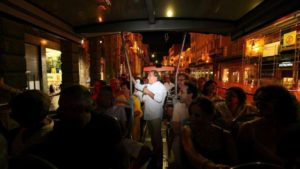Protesto vivamente la progressiva intrusione del rumore gratuito nelle nostre vite. E’ praticamente impossibile evitare situazioni in cui non ci sia accanto qualcuno o qualcosa propenso ad infrangere la nostra pace, anche non volutamente. La barra di tolleranza al rumore in generale si sta alzando pian pianino, dando luogo ad una sorte di inflazione sonora. Il silenzio è diventato, come un vuoto, una cosa da colmare subito.
 Non si discute il fatto che il rumore di fondo sia diventato una necessità della vita quotidiana. Trovare un bar o ristorante che non abbia una musica pulsante ed invadente è una vera sfida. L’arte della conversazione a tavola è passata in seconda linea o è svanita completamente. Basta guardarsi attorno per notare quanta gente, obliviosa degli altri, gira con un cellulare applicato alla tempia. Gli apparecchi acustici, per anni disdegnati per motivi estetici, sono stati sostituiti da ogni specie di filo o antenna che possa sporgere dall’orecchio. Alcuni emettono una luce scintillante mentre altri assomigliano ad una sigaretta piegata. E fino a pochi anni fa uno che parlasse da solo animatamente per strada era considerato un folle; oggi invece con l’avvento degli auricolari non ci si può essere più sicuri.
Non si discute il fatto che il rumore di fondo sia diventato una necessità della vita quotidiana. Trovare un bar o ristorante che non abbia una musica pulsante ed invadente è una vera sfida. L’arte della conversazione a tavola è passata in seconda linea o è svanita completamente. Basta guardarsi attorno per notare quanta gente, obliviosa degli altri, gira con un cellulare applicato alla tempia. Gli apparecchi acustici, per anni disdegnati per motivi estetici, sono stati sostituiti da ogni specie di filo o antenna che possa sporgere dall’orecchio. Alcuni emettono una luce scintillante mentre altri assomigliano ad una sigaretta piegata. E fino a pochi anni fa uno che parlasse da solo animatamente per strada era considerato un folle; oggi invece con l’avvento degli auricolari non ci si può essere più sicuri.
Il concetto della privacy ormai è diventato relativo. In autobus, per esempio, la gente con un cellulare conclude affari delicati o cede informazioni personali ad alta voce, mentre gli altri passeggieri sono costretti ad origliare. E quanti brani famosi di musica classica sono stati trivializzati per creare delle suonerie personali? Non posso più sentire le prime note del Lago dei Cigni senza provare un certo disgusto. E Beethoven si arrotolerà nella tomba ogni volta che Fur Elise segnala l’arrivo di una chiamata banale, per esempio la conferma di un’ordine in pizzeria.


Arcidecibel in Autobus
Chi ha la sfortuna di abitare in una strada principale potrà testimoniare al volume assordante dei motorini fuoristrada pilotati da adolescenti che gareggiano ogni volta che il tempo diventa mite. Pare che non esista nessun obbligo di marmitta; infatti i ragazzini sembrano di derivare più piacere più alto sia il numero di decibel prodotti. A Bologna da maggio fino ad ottobre la gente si diverte a bordo di un pullman scoperto fornito di musicisti che recitano, cantano e strimpellano con amplificatori potenti accesi. Mentre il bus percorre le vie del centro storico – sempre dopo il tramonto – suscitano dai passeggeri ferventi applausi ed urli ad ogni angolo, a discapito di chi si corica prima di mezzanotte.
E’ una vera festa mobile.

Numero in Crescita
Con la creazione di zone pedonalizzate nei centri città sono comparse nuove fonti di  rumore molesto. Mentre in passato uno poteva sedersi in piazza per godere un’aperitivo ed abbandonarsi ai propri pensieri, ora in ogni nicchia sorge ogni specie di artista autoproclamato, alla caccia di soldini. Prima “unplugged,” questi musicisti hanno scoperto amplificatori portatili per penetrare la folla. Facendo solo pochi passi uno può sentire i fischi dell’ocarina peruviana, il grido degli imitatori di Led Zeppelin, o i tonfi snervanti del ragazzino che martella una batteria improvvisata. L’atmosfera carnevalesca è completata da una varietà di ballerini di breakdance, furbi vestiti da Topolino per attirare l’attenzione dei piccoli, e uomini-statua ricoperti di tempera in costume da cowboy che si tengono immobili su un piedistallo.
rumore molesto. Mentre in passato uno poteva sedersi in piazza per godere un’aperitivo ed abbandonarsi ai propri pensieri, ora in ogni nicchia sorge ogni specie di artista autoproclamato, alla caccia di soldini. Prima “unplugged,” questi musicisti hanno scoperto amplificatori portatili per penetrare la folla. Facendo solo pochi passi uno può sentire i fischi dell’ocarina peruviana, il grido degli imitatori di Led Zeppelin, o i tonfi snervanti del ragazzino che martella una batteria improvvisata. L’atmosfera carnevalesca è completata da una varietà di ballerini di breakdance, furbi vestiti da Topolino per attirare l’attenzione dei piccoli, e uomini-statua ricoperti di tempera in costume da cowboy che si tengono immobili su un piedistallo.
Rimpiango i tempi tranquilli in cui il rumore più fastidioso era quello del solfanaio col carro e cavallo, oppure l’auto con altoparlante che annunciava spettacoli, per esempio “Stasera al Cinema Gambrinus di Pennabili: Balla Con i Lupi.” Si poteva parlare col prossimo in ristorante senza urlare. E ci voleva un gettone e l’insegna della SIP per telefonare. Che bello!
I enthusiastically protest the creeping intrusion of unnecessary noise in our lives. It’s almost impossible to avoid situations in which there is someone or some thing ready to interrupt, even unintentionally, our peace and quiet. The bar of tolerance of noise in general is slowly rising, giving way to a sort of “sound” inflation. Silence is becoming, like a vacuum, something which must be immediately filled.
 It’s undeniable that background noise has become a necessary part of our daily lives. Finding a restaurant or bar without overwhelming or pulsating background music is a real challenge. The art of conversation at table has been relegated to a secondary status or has been eliminated completely. And one has only to look around to notice how many people, oblivious to the presence of others, walk about with a cell phone attached to their temples. Hearing aides, so shunned in the past for esthetic reasons, are now dwarfed by a variety of wires and antennas that protrude from the ear. Some of them emit a flashing light while others simply look like a bent cigarette. Until only a few years ago whoever walked down the street talking to himself and gesticulating wildly was considered a mental case; now one cannot be so sure.
It’s undeniable that background noise has become a necessary part of our daily lives. Finding a restaurant or bar without overwhelming or pulsating background music is a real challenge. The art of conversation at table has been relegated to a secondary status or has been eliminated completely. And one has only to look around to notice how many people, oblivious to the presence of others, walk about with a cell phone attached to their temples. Hearing aides, so shunned in the past for esthetic reasons, are now dwarfed by a variety of wires and antennas that protrude from the ear. Some of them emit a flashing light while others simply look like a bent cigarette. Until only a few years ago whoever walked down the street talking to himself and gesticulating wildly was considered a mental case; now one cannot be so sure.
The much-touted concept of privacy in Italy is relative at best. On the public bus, for example, people conduct delicate business dealings and exchange personal information in a loud voice, forcing fellow passengers to hear every syllable. And how many excepts of classical music have been trivialized by making them the ring tone. I can’t hear the opening notes of Swan Lake any more without being somewhat disgusted. Beethoven would turn over in his grave if he could hear Fur Elise used to announce the arrival of some banal message, like a pizza pick-up order.

Arcidecibel in Autobus
Whoever lives near a major street in Bologna can attest to the deafening noise produced by adolescents racing their dirt bikes – quite permissible on Italian roadways – whenever the weather permits. There appears to be no law requiring mufflers on these contraptions, and the louder they are the better the riders like it. In Bologna there is also a sort of noise-delivery service which operates from May to October: a large uncovered bus staffed by entertainers and musicians who recite, sing and play instruments with microphones. The bus cruises the streets after dark, loaded with excited partygoers who are exhorted to sing, yell and applaud at every opportunity – and too bad if you plan to go to bed before midnight!


Numero in Crescita
A few years ago the main city intersection around Piazza Maggiore was designated as a pedestrian-only area. This has had the unforeseen effect of facilitating new sources of irritating noise. In the past one could sit at a table in the main square to enjoy an aperitivo while enjoying one’s thoughts in peace. Now self-proclaimed street “artists” burst forth from every corner in their search for money. They have also discovered that portable amplifiers help them to penetrate the crowds – gone are the days of the occasional accordion player. Merely by taking a few steps one can hear the strains of a Peruvian ocarina, the shrieks of a Led Zeppelin imitator, or the unnerving booms of the kid who has improvised a drum set with a collection of old trash cans. Street hip hop dancers, gypsies dressed as Mickey Mouse to attract the children, and men covered in paint or foil immobile on pedestals to represent cowboys or clowns help to complete the carnival-like atmosphere which has overtaken the Center on weekends.
I look back wistfully to the days when the loudest noise was the junk man’s horse cart (yes, they did exist up until the 1970’s!), clipclopping slowly down the block, or the automobile with roof loudspeaker announcing events in town, such as “This evening at Cinema Gambrinus: Dances with Wolves!” One could actually hear one’s dinner companion across the table. And eat one’s meal without the floor – and one’s stomach -vibrating to boom-shaka-laka-boom music. I guess I must be old.

Another great and well thought out article.! !